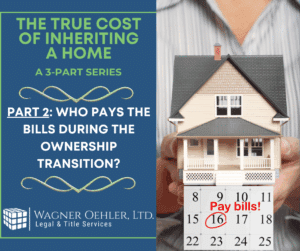Menu


 The True Cost of Inheriting a Home (Part 2)
The True Cost of Inheriting a Home (Part 2)A home is the single largest expense most people will ever undertake—whether they buy it themselves or inherit it from someone else. While understanding the true cost of ownership is essential, heirs also need to consider what happens in the transition period between a loved one’s death and the moment they legally become the new owner. During this time, bills and expenses don’t disappear; they must be paid on time and in full, sometimes for months or even years, depending on the estate’s administration process.
If the deceased owned the home in their individual name, the property will likely need to go through probate before title can be transferred. Probate is a court-supervised process for settling final affairs and distributing accounts and property. Until the probate is complete, ongoing expenses generally fall to the estate itself. The executor (or personal representative) uses estate funds to cover the mortgage, taxes, insurance, and upkeep. If there isn’t enough liquidity, other accounts or property may need to be sold to cover costs.[1][1]
For homes held in a trust, the trustee pays expenses with trust funds. As with probate, a lack of cash flow can require liquidation of trust assets to stay current on obligations.[2]
When there is no clear estate plan—or disputes arise over who inherits the property—the home may sit idle. This scenario often leads to mounting expenses, potential tax complications, and even a decline in property value if upkeep and payments lapse.[3]
Once the title legally transfers, financial responsibility shifts entirely to the new owner. This includes mortgage payments, property taxes, and insurance obligations. Without sufficient preparation, the heir may face a heavy financial strain.[4]
👉 Estate plans can mitigate this by setting aside cash reserves or liquidity specifically earmarked for home-related costs. Holding these funds in a trust can spare loved ones financial strain and provide breathing room to decide whether to keep, sell, or rent the property.
To learn more about estate administration, keep an eye on our Events page located at: https://www.wagnerlegalmn.com/events/.
If you need assistance after a loved one has passed, or you would like to discuss your estate plan, please contact us to get started.
Want to stay informed? Subscribe to our quarterly newsletter for updates.
[1] American Bar Association, Guide to Probate and Estate Administration.
[2] Uniform Trust Code, Commentary on Trustee Duties.
[3] AARP, Probate and Real Estate: Common Delays and Costs.
[4] Cornell Law, Estate Settlement Practices.
© 2025 Wagner Oehler, Ltd
Legal Disclaimer | Privacy Policy
Law Firm Website Design by The Modern Firm